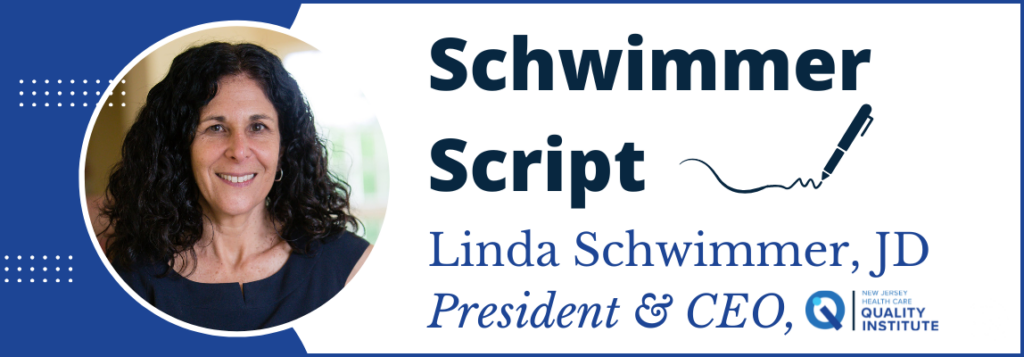In early March five years ago, I sat in the ICU waiting room of a Bergen County hospital where my father-in-law was being discharged after a fall. The hospital needed the bed, and he could safely return home.
It was the earliest days of COVID in New Jersey, and I recall the surge of fear that the virus was coming — and fast. My thought: I need to get my in-laws, and myself, out of here as quickly as possible. Ten days later we were in shut down. Those days were fraught with great anxiety and little information.
At the Quality Institute, like many organizations, we wanted to help however we could. We quickly recognized the role we could play bringing people together — virtually — to share information as we learned more about the pandemic every day. We worked with the New Jersey Department of Health and many others on developing guidance for hospitals on maternity protocols. We reached out to our members in different sectors of health care, including pharmaceutical companies and medical practices, plans and community groups, as well as state officials and local public health officers. We captured observations from the front lines. We saw people roll up their sleeves and work together with unprecedented collaboration.
While still living through the pandemic, we worked with BioNJ to pull together a workgroup, and drawing from their input and observations, we created Emerging From COVID-19: An Action Plan for a Healthier State. The pandemic exposed long-existing gaps and inequities in our health system and our state that required urgent attention. Our plan had 24 recommendations in four areas:
- Supporting and expanding the health care workforce
- Increasing support for alternative models to deliver and pay for care
- Addressing health-related social needs
- Revitalizing public health infrastructure
We outlined a plan to enable New Jersey to emerge from the pandemic stronger and better able to meet future health challenges for everyone. Today, as I look at that report, I see areas where we improved and places where we still have substantial work ahead. And sadly, in some areas, such as trust in public health, we are worse off than before the pandemic.
Here’s where we emerged stronger:
- Through regulatory change, we enabled virtual prescribing of medication-assisted treatment, and through public discourse, we reduced stigma around mental health needs and substance use disorder.
- By modifying payment rules, we enabled telehealth and home monitoring as additional forms of accepted and convenient care.
- By providing trainings, we educated providers and facilities about infection control and risk mitigation, making health care safer for patients.
- By expanding many of our social services, we recognized more broadly than ever before that being healthy requires safe housing, quality childcare, nutritious food, and receiving respectful care.
Here’s where we still need to make progress:
- Building trust in public health, especially on vaccines.
- Investing more in comprehensive primary care, including family care practices, mental health, maternal health, pediatrics, and oral health — especially as we face potential deep cuts to Medicaid funding.
- Moving forward with both integrated licensing of physical and mental health facilities and implementing existing laws that authorize additional types of mental health providers to practice in New Jersey Medicaid.
- Modernizing and improving efficiency of state licensing, data systems, and regulatory oversight of health care professionals to support greater access to care, as well as better recruitment and retention of health care workers.
- Improving the quality of New Jersey’s nursing homes.
- Reducing stigma and increasing access for health care workers seeking mental health care.
Since the first COVID case was confirmed in Bergen County on March 4, 2020, over 37,315 people in New Jersey died due to the virus and 193,039 people were hospitalized. The global emergency is now over, but our priorities have not disappeared. I encourage you to review our report and consider how your organization can further this work or join our call to advance these needed improvements.
Five years later, the pandemic is a wakeup call we still cannot ignore.

